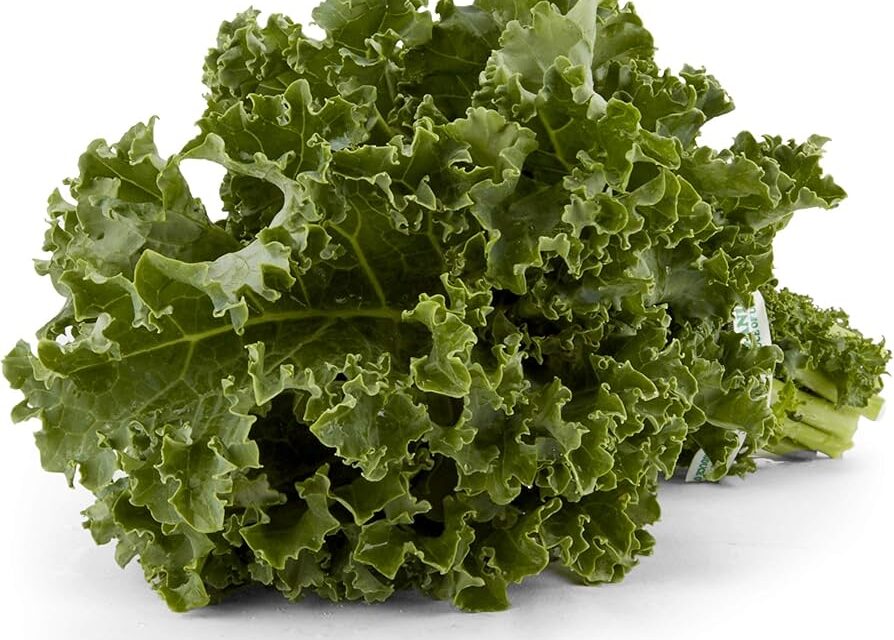The nutritional profile of Kale
Kale is a nutrient-dense leafy green vegetable known for its outstanding nutritional profile, making it an ideal choice for anyone looking to boost their daily intake of essential vitamins, minerals, and macronutrients. Here’s a detailed look at the nutrients found in kale and how they contribute to health:
Macronutrients in Kale
- Calories: Kale is low in calories, with around 33 calories per cup of raw kale, making it ideal for weight management.
- Protein: Contains approximately 2.9 grams of protein per cup, which is notable for a leafy green and supports muscle health and cellular function.
- Fiber: One cup provides 2.6 grams of dietary fiber, promoting digestive health and aiding in blood sugar regulation.
- Carbohydrates: A cup of kale contains about 6.7 grams of carbohydrates, primarily from fiber, which supports digestive health.
Vitamins in Kale
- Vitamin A: Kale is rich in beta-carotene, a precursor to vitamin A, which supports eye health, immune function, and skin health.
- Vitamin C: Provides around 80 mg per cup, exceeding the daily recommended intake. Vitamin C is essential for immune function, skin health, and antioxidant protection.
- Vitamin K: With over 500 mcg per cup, kale provides more than 600% of the recommended daily intake, promoting blood clotting, bone health, and heart health.
- B Vitamins: Contains small amounts of B vitamins, including B6 (pyridoxine), folate (B9), and niacin (B3), which help support energy metabolism, brain function, and red blood cell formation.
Minerals in Kale
- Calcium: One cup of raw kale provides around 100 mg of calcium, supporting bone health and muscle function, which is beneficial, especially for those on plant-based diets.
- Potassium: Contains about 329 mg of potassium per cup, which is crucial for maintaining healthy blood pressure, heart health, and fluid balance.
- Magnesium: Kale provides roughly 22 mg per cup, promoting muscle function, nerve health, and energy production.
- Iron: While plant-based, kale contains a small amount of iron (1.2 mg per cup), which is essential for oxygen transport and energy production.
- Phosphorus and Zinc: Kale offers small amounts of these minerals, supporting cellular health, immune function, and metabolic processes.
Antioxidants and Phytonutrients in Kale
- Lutein and Zeaxanthin: These antioxidants help protect eye health by filtering harmful blue light and reducing the risk of macular degeneration.
- Flavonoids: Includes quercetin and kaempferol, which have anti-inflammatory, antiviral, and heart-protective benefits.
- Glucosinolates: Sulfur-containing compounds in kale support liver detoxification and may have cancer-fighting properties.
Kale’s comprehensive nutritional profile makes it a valuable addition to a balanced diet, supporting immunity, heart health, bone strength, and overall wellness.
Find out more about Kale as a superfood
How Chia Seeds Support Health
by fab_brands | January 15, 2025 | nutrition, superfoods | 0 Comments
Chia Seeds as a Superfood
by fab_brands | January 15, 2025 | nutrition, superfoods | 0 Comments
Frequently Asked Questions about Dates
by fab_brands | December 1, 2024 | superfoods | 0 Comments
How Dates Support Health
by fab_brands | December 1, 2024 | superfoods | 0 Comments
Nutritional Profile of Dates
by fab_brands | December 1, 2024 | superfoods | 0 Comments
Frequently Asked Questions about Kale
by fab_brands | November 25, 2024 | superfoods | 0 Comments
How Kale Supports Health
by fab_brands | November 25, 2024 | superfoods | 0 Comments
Nutritional Profile of Kale
by fab_brands | November 25, 2024 | superfoods | 0 Comments
Frequently Asked Questions about Eggs
by fab_brands | November 18, 2024 | superfoods | 0 Comments
How Eggs Support Health
by fab_brands | November 18, 2024 | superfoods | 0 Comments



